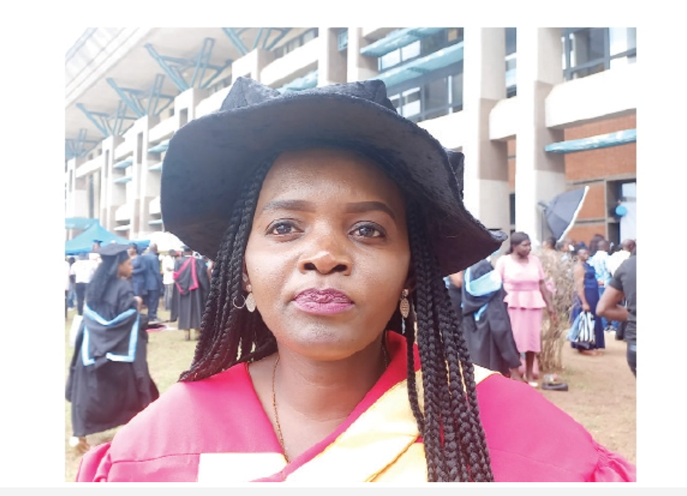Zimbabwe (National University of Science and Technology) Dr Ncube Research Popularises Inkunzane

The calling out of her name with the prefix “Dr” in front of a sea of faces during the 28th National University of Science and Technology (Nust) graduation ceremony recently was a proud moment for the 37-year old mother of one. It was a culmination of four years of commitment, hard work, sleepless nights and the balancing act of being a mother, wife and student, all in an effort to achieve her childhood dream.
Dr Ncube (37) was among a group of seven Nust students who graduated with Doctor of Philosophy (PhD). Her thesis was Ethnobotany Ecology and Medicinal Efficiency of Harpagophytum also called grapple plant, wood spider, and most commonly devil’s claw. It is a genus of
plants in the sesame family, native to southern Africa.
Ethnobotany is the study of a region’s plants and their practical uses through the traditional knowledge of a local culture and people. The study provides a wealth of knowledge that contributes to the preservation of indigenous knowledge of devil’s claw, sustainable management of the plant as well as further contribute to pharmacological interventions. Devil’s claw (also known as inkunzane enkulu or igagamezi) roots have been used to treat a wide range of ailments such as fever, pain, arthritis, and indigestion. Devil’s claw tubers can be soaked in water and if dried the tubers are crushed and added to porridge. When fresh, tubers can be chewed.
Born in Bulawayo, Dr Ncube attended Thomas Rudland Primary School before proceeding to Usher High School for her O-level studies. She did her A-levels at St Patrick’s High School. Dr Ncube enrolled at Nust under the Faculty of Environmental Science in the Forest Resource and Wildlife Department and studied Forestry and Wildlife Management.
She holds a Post Graduate Diploma in Higher Education with Nust and Masters Level courses with Uppsala University in Sweden. Dr Ncube, who is a lecturer at Nust, said working on her PhD was not a walk in the park.
“Personally, what drives me in life is making a positive contribution to humanity. Through my work, which I will publish I want to contribute to mankind and create a ripple effect,” she said.
“I have always had a passion in the natural resource area. In my previous job, I worked with communities that were doing value addition of natural resources, so that’s where I derive my passion from.”
Dr Ncube said for her to attain a doctorate degree, she made sacrifices and at times leaving her four-year-old son at home for months and working late at night. Turning to her study, Dr Ncube said she wanted the devil’s claw to benefit the communities from where it grows. “I opted to study this plant because it grows in areas around local communities and it’s a commercially viable with a vast potential to benefit the communities,” she said.
“I hope through my studies this can inform decision making in terms of sustainable utilisation of the plant in Zimbabwe and protect it. This plant is being exported to places like Germany, but local use is minimal.” Compared to synthetic drugs such as diclofenac, Dr Ncube said when used correctly, the devil’s claw has no side effects.
“I did tests in the laboratory where I was comparing the plant’s strengths to diclofenac and I discovered that it was very comparable, in its role in terms of treatment of arthritis in the lab. Of course, further tests are required to do validation and dosages,” said Dr Ncube.
“As a herbal supplement, the plant has potential to be used and explored to complement herbal medicine, especially in arthritis-related conditions.”
Dr Ncube said during her site studies, she discovered that the plant is used by many indigenous people in rural communities in areas such as Hwange, Tsholotsho, Matobo and Gwanda districts.
“The people use it for many different reasons, such as cultural uses and most importantly it’s used to treat headaches, pain inflammation and also use it for their animals as well,” she said.
Dr Ncube said funding for research purposes is the main challenge for most PhD students.
“Access to funding is not as easy, but I was fortunate that Nust and Buy Innovations Zimbabwe funded me to kick start this study. I started off by collecting my samples and ecological surveys and was also helped by Higher Life Zimbabwe in 2019 to conduct my laboratory work,” she said.
Dr Ncube said Covid-19 disruptions also affected her studies.
“When Covid-19 hit the country in March 2020, I couldn’t travel to South Africa to do laboratory tests as well as going to the field to collect data. However, the samples were stored at Nust, and then there was a lockdown,” she said.
Dr Ncube said intermittent power cuts also affected her studies since the samples are kept in freezers because they require low temperatures.
“I had to wait for last year’s rainy season so that the plants could grow again and then collect more samples. My long-term plan is to continue contributing to research and education,” she said. -@bonganinkunzi
